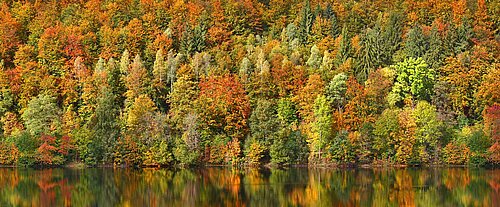Environmental protection and conservation are more important than ever before: the diversity of plant and animal species is shrinking rapidly worldwide, with air, water and soil pollution remaining a major challenge. ZUG provides support to the Federal Government – in Germany, Europe and worldwide.
Species loss and the global loss of biodiversity have both accelerated rapidly in recent decades, with one in eight plant and animal species now acutely threatened with extinction. This trend is being driven by many factors, ranging from population growth and spread, unsustainable land use that destroys natural habitats, overfishing, environmental pollution and anthropogenic climate change. The negative impacts of biodiversity loss also affect humans everywhere in the world, threatening their basis for existence, their economies and health in equal measure.
Environmental protection as government policy
Since 1994, environmental protection has been a core policy enshrined in the German Basic Law (‘Grundgesetz’). Climate change has brought this obligation into sharper focus: the German Federal Climate Change Act underlines the importance of natural ecosystems for climate change mitigation, with carbon sequestration by natural carbon sinks being just one example.
At its heart, conservation is centred on preserving biodiversity, not least because human interventions – especially as a result of economic activities – can have a serious impact on ecosystems. Rewilding spaces previously used for human cultivation is therefore a key part of nature conservation.
The German Federal Government supports environmental protection and conservation with many national and international initiatives, ranging from the establishment of nature reserves and national parks to avoiding littering and passing waste legislation, from air and water pollution control to strengthening sustainable agriculture and protecting insect populations.
Funding – a key instrument
Supporting third-party projects is a key instrument within government environmental and conservation policy: ZUG creates the link between sponsors on the one hand and local actors on the other. ZUG encourages project development, provides information about funding options, reviews proposals and ensures funds are properly used, assists with projects, networks actors, and develops new ideas for environmental protection and conservation.
Current programmes and initiatives
Germany plans to restore more parts of its territory to an original state in which nature can develop undisturbed: the Federal Government’s Rewilding Fund supports the creation and protection of these areas.
Although peatlands are important for the long-term storage of carbon, their drainage for agricultural use has resulted in the release of CO2: as part of the Pilot Project for Peatland Protection, the Federal Ministry for the Environment, Nature Conservation and Nuclear Safety (BMUV) is funding projects that demonstrate how drained and degraded peatland areas can be rewetted and managed in their original state.
Marine debris is a global problem: with its Funding Programme Against Marine Debris, the BMUV is supporting international efforts to protect ocean ecosystems. The top priority here is avoiding plastic waste, to prevent marine debris occurring in the first place.
Since 2021, the BMUV has worked with the European Environment Initiative (EURENI) to promotes dialogue within society and debates about environmental topics among government and non-governmental organisations within Europe. This action is intended to ramp up intra-European cooperation on environmental protection, which will also work to consolidate European integration in general.


